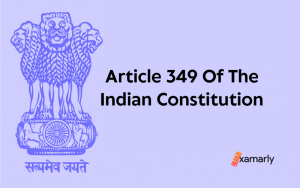Are you seeking the best solution for your question ‘how to write answers in UPSC mains?’ Preparing for the UPSC Mains can be daunting, especially when it comes to writing answers that can earn you top marks.
Many candidates struggle with structuring their answers, selecting the most relevant information, and presenting it concisely and articulately. If you are one of these candidates, you’ve come to the right place.
In this article, we will explore effective strategies to help you write high-scoring answers in the UPSC Mains. We’ll cover everything from understanding the question to organizing your thoughts to crafting a compelling argument.
So, let’s dive in and learn how to write answers in the UPSC Mains that impress examiners and set you on the path to success.
- How to Score Higher on UPSC Mains Exam?
- Score Booster Pro Tips for UPSC Mains Answer Writing
- 1. Read The Questions Carefully
- 2. Up to the Mark
- 3. Jot Down or Sketch a Structure Mentally
- 4. Make It Presentable
- 5. Induce the Keywords
- 6. Don't Cross the Word Limit
- 7. Use Diagrams and Flowcharts
- 8. Give Relevant Examples
- 9. Be Innovative
- Important Points to Be Kept in Your Mind
- How Your Answer Should Be?
- Conclusion
- Frequently Asked Questions
- What are the best tips for writing answers in the UPSC mains exam?
- How do I nurture my skills for the UPSC mains exam?
- Should I use technical language in my answers for the UPSC mains exam?
- How can I effectively manage my time while writing answers for the UPSC main exam?
- What are some common mistakes to avoid while writing answers for the UPSC mains exam?
- Should I use bullet points in my answers for the UPSC mains exam?
- How important is handwriting in the UPSC mains exam?
How to Score Higher on UPSC Mains Exam?
The UPSC Mains exam is a highly competitive exam that tests a candidate’s aptitude and understanding of various subjects. To score higher on the UPSC Mains exam, candidates need to follow a strategic approach.
First, they must understand the syllabus and exam pattern, which consists of nine papers, including essay writing, general studies, and optional papers. Candidates should also develop strong writing skills and practice regularly.
Additionally, practising the previous year’s question papers and revising them will help candidates manage their time and improve their speed.
Staying updated with current affairs is also crucial as it plays a significant role in the UPSC Mains exam. Candidates should focus on understanding the concepts and their practical applications, seeking help from experienced teachers or mentors if necessary.
Lastly, time management is crucial for scoring higher on the UPSC Mains exam, and candidates should set a time limit for each question and work on their speed.
Seeking feedback and guidance from experienced teachers, coaching institutes, or peers who have already cleared the exam can also help improve performance. With consistent efforts and a positive attitude, candidates can clear the UPSC Mains exam with flying colours.
What is the Word Limit for UPSC Mains Answer?
The word limit for UPSC mains exam answers varies depending on the question. The UPSC provides clear instructions on the word limit for each question, and candidates are expected to answer the question within that limit.
In general, the word limit for each question can range from 150 to 300 words, but some questions may have a higher or lower word limit.
It’s important for candidates to carefully read the instructions and plan their answers accordingly to ensure that they stay within the given word limit.
Candidates who exceed the word limit may receive a lower score, as they may not be able to fully address the question or provide sufficient evidence to support their answer.
Score Booster Pro Tips for UPSC Mains Answer Writing
Answer writing practice, long hours of studies, reading, and covering a major portion of the UPSC syllabus will not work, if you are unable to write a lucid answer in a UPSC Mains. And that too in a predefined time limit with a word count constraint.
So the following strategies or points need to be followed while writing a clear-cut, precise, and well-illustrated answer in the UPSC Mains exam. Let us find out how to write answers in UPSC mains.
1. Read The Questions Carefully
Before attempting any question, try to be careful while reading the question paper and understand what the examiner wants you to write.
For example, try to understand whether the examiner is seeking critical thinking or needs an explanation of the question asked.

Related: 7 Ways: Develop Critical Thinking for UPSC Exam Preparation
2. Up to the Mark
UPSC Civil Services Examination score directly depends on what you write in an answer sheet provided to you in the UPSC mains exam and indirectly depends on how much you studied, because the examiner will check your answer sheet and not your study schedule.
So write a concise answer which is up to the level expected by an examiner. Don’t diverge from the question.
3. Jot Down or Sketch a Structure Mentally
When you’re writing an answer for an exam, it’s useful to mentally sketch the structure of your answer. By doing so, you’ll have a better idea of what to include in your answer.
This is important because answers must be well-structured and contain sufficient content to justify the length of your answer.
For this, first of all, list down all the points (with pencil) which are essential from the point of question (or try to mentally sketch all the important points) and then compose your answer with these jotted-down points. Make this a regular practice in the exam preparation phase and it will become a habit over some time.
Related Post: How To Prepare For UPSC Prelims And Mains Together Like An Absolute Pro!
4. Make It Presentable
Try to write in neat handwriting. Your complete answer should be more precise, and clear-cut, and not make an impression on an examiner that you had just filled out the answer sheet. As there will be a time constraint in the exam hall, it is better to practice good handwriting daily to increase speed.
When writing an excellent answer for UPSC mains, it is important to consider several factors. Your answer should be clear, precise, neat, and illustrative. It should also demonstrate your understanding of the topic.
It is important to know the direction in which the question is framed, as it will influence the quality of your answer.
Analyze all important topics and subjects. Write a summary of all relevant facts and data. Start your essay with an introductory paragraph. Then, state your main point.
Finish with a positive conclusion. Use as many examples as possible. Be specific, but remember to avoid jargon and technical words. Make your answer presentable by adding sub-points and flow charts.
5. Induce the Keywords
Don’t forget to induce the keywords in your answers as these are the words that the examiner seeks. Remember keywords act as a score booster, so make sure that you highlight all the keywords while writing answers in UPSC Mains Exam.
Now have you ever mulled over the fact of why keywords are important? It is because keywords not only highlight the main points of your answers but also convey to the examiner the deep understanding of the aspirants in that respective subject.
6. Don’t Cross the Word Limit
One of the most important things to remember in UPSC Mains answer writing is not to go over the word limit. While you may think that this is a simple rule, the truth is that it is far more difficult than it looks.
Often, we make the mistake of exceeding the word limit without realizing it.
Try to stick to the word limit and induce all the important points within that word count. To follow the word count constraint, omit all the points which are unnecessary from the viewpoint of questions asked in the UPSC IAS Mains Exam.
7. Use Diagrams and Flowcharts
Using diagrams, flowcharts, or tables can be an effective way for candidates to present their answers in a more visually appealing and organized way during the UPSC Mains exam. This technique can help candidates save time, increase their efficiency, and better communicate their ideas to the examiner.
In the UPSC Mains exam, candidates are required to answer a wide range of questions that cover various topics, from history and geography to economics and politics.
These questions often require candidates to present complex information concisely and clearly, and using diagrams and flowcharts can help candidates achieve this goal. Writing fact-based answers by using diagrams and flowcharts will boost your score.
For example, if a question asks candidates to explain the steps involved in a particular process, they can use a flowchart to provide a visual representation of the process.
Similarly, if a question requires candidates to compare and contrast two different concepts or ideas, they can use a table to organize their thoughts and present the information in a more structured manner.
8. Give Relevant Examples
Providing relevant and real-world examples in a simple sentence can be a highly effective strategy for candidates to illustrate their understanding of a topic and make their answers more impactful during the UPSC mains exam.
In the UPSC mains exam, candidates are required to demonstrate a deep understanding of a wide range of topics, from economics and governance to history and philosophy.
By providing relevant and real-world examples, candidates can show that they not only understand the concepts being discussed but also have practical knowledge of how these concepts operate in the real world.
For example, if a question requires candidates to discuss the impact of climate change on the economy, providing real-world examples such as the effects of droughts on agriculture, or the economic impact of natural disasters, can help to illustrate the points being made.
Similarly, if a question asks candidates to discuss the impact of globalization on local industries, providing examples of industries that have been affected by globalization can make the answer more impactful.
9. Be Innovative
Being creative is an important aspect of answering questions in the UPSC mains exam. While objectivity is crucial, candidates who are creative in their approach can stand out from the crowd and impress the examiner with their unique perspectives, innovative solutions, and insights that are not commonly discussed.
The UPSC mains exam is designed to test candidates’ analytical abilities, knowledge of various subjects, and ability to think critically. Being creative in the way they approach a question can demonstrate their ability to think beyond the obvious and provide well-reasoned answers.
For example, if a question asks candidates to discuss the impact of technology on education, a candidate who provides a unique perspective such as the use of virtual reality to provide immersive educational experiences.
Similarly, a candidate who offers innovative solutions such as using blockchain technology to create tamper-proof educational records can demonstrate their ability to think outside the box.
Important Points to Be Kept in Your Mind
The following points should be kept in mind while writing an answer in UPSC Mains.
- Make sure that you first attempt the question which you know very well. This will not only save you time but also help you to write such answers with a fresh mind and under less pressure.
- To Filling out the entire answer sheet doesn’t mean you have done your part. Stick to the point which was needed for answering the questions. Resist your pen from writing bush in the Mains examination.
- Write a magnetic answer to drive the score from the view of the competition. This doesn’t mean using fancy or flowery language. This implies using simple error-free language. But remember, whatever you write should make sense with little to no complex language.
- Opt for a multifaceted approach for effective answer writing in UPSC CSE Mains Examination. That is try to think from every aspect( i.e., use a 360° viewpoint before answering) and then write it on paper.
How Your Answer Should Be?
- Your precise answer should match the level of an officer. What is meant here, is that when the examiner goes through your answer, he/she should straightaway make out that this answer has been penned by a future officer.
- Your answer imprints an impression on a grader in such a manner that would compel him to understand that the aspirant acquires a deep understanding of a chosen subject and have a clear-cut knowledge of GS paper as well.
- Your ideal answer should give a hint to the examiner that you deserve to be an upcoming administrative officer as he/she has a different but much-needed point of view to observe the nation and its problems. To make your effort count you must practice answer writing for UPSC Mains Exam as “Rome was not built in a day”.
Conclusion
In conclusion, the UPSC mains exam is a highly competitive and challenging test, and writing answers that are informative, structured, and well-supported by evidence is crucial for success.
Candidates must be well-prepared, have a deep understanding of the subject matter, and be able to communicate their ideas effectively to score high on the exam.
By following the tips outlined above and consistently practising answer writing, candidates can increase their confidence, improve their writing skills, and achieve success in the UPSC mains exam.
Hope we have given you the best tips for your question ‘how to write answers in UPSC mains?’. Ace your UPSC mains exam with these effective tips!
Frequently Asked Questions
What are the best tips for writing answers in the UPSC mains exam?
Some of the best tips for writing answers in the UPSC mains exam include practising answer writing, using diagrams and flowcharts, providing real-world examples, being creative in your approach, and ensuring your answers are structured and concise.
How do I nurture my skills for the UPSC mains exam?
To improve your answer writing skills for the UPSC mains exam, you can practice answer writing, read widely, and develop your vocabulary. It’s also important to understand the UPSC exam pattern, syllabus, and previous years’ question papers.
Should I use technical language in my answers for the UPSC mains exam?
While technical language can demonstrate your knowledge of the subject, it’s important to strike a balance between technical language and simplicity. Candidates should aim to communicate their ideas effectively and ensure that their answers are easily understandable by the examiner.
How can I effectively manage my time while writing answers for the UPSC main exam?
To effectively manage your time while writing answers in the UPSC mains exam, you should practice time management, develop a strategy for tackling the exam, and prioritize the questions based on your strengths and weaknesses.
What are some common mistakes to avoid while writing answers for the UPSC mains exam?
Some common mistakes to avoid while writing answers for the UPSC mains exam include providing incomplete answers, not answering the question asked, and not supporting your answers with evidence. Candidates should also avoid writing in a flowery or verbose manner.
Should I use bullet points in my answers for the UPSC mains exam?
Using bullet points can be an effective way to organize your thoughts and make your answers more structured and concise. However, it’s important to ensure that your bullet points are well-supported by evidence and that they fully answer the question asked.
How important is handwriting in the UPSC mains exam?
Handwriting is an important factor in the UPSC mains exam as it affects the readability of your answers. Candidates should aim to write legibly and ensure that their handwriting is neat.






